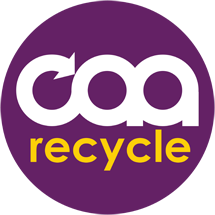 CAA believes that any vibrant discipline must continually return to its own roots and re-evaluate legacy data if it is to progress. Furthermore, in the field of Archaeology it provides a far less destructive means of researching the past, and maximizes the return on resources invested in fieldwork. Digital technologies have a particularly strong role to play in this regard, thanks to their ability to synthesize large volumes of information and because they often apply new techniques unavailable to the original investigators. To this end, CAA is commencing an annual CAA Recycle Award that seeks to recognize those who breathe new life into old data.
CAA believes that any vibrant discipline must continually return to its own roots and re-evaluate legacy data if it is to progress. Furthermore, in the field of Archaeology it provides a far less destructive means of researching the past, and maximizes the return on resources invested in fieldwork. Digital technologies have a particularly strong role to play in this regard, thanks to their ability to synthesize large volumes of information and because they often apply new techniques unavailable to the original investigators. To this end, CAA is commencing an annual CAA Recycle Award that seeks to recognize those who breathe new life into old data.
The CAA Recycle Award will be presented jointly to 1. the best exemplar of data re-use at the conference, and 2. the project or institution that made available the source dataset/s.
The Award
The CAA Recycle Award will be presented jointly to 1. the best exemplar of data re-use at a CAA International Conference (the recycler), and 2. the project or institution that made available the source dataset/s (the originator/s). Both winners will be entitled to display a ‘CAA Recycle Award’ logo on their website.
Terms and conditions
- Any project to be considered for the award must indicate its eligibility at the time of submitting their abstract to CAA.
- For consideration, the recycling project must have applied a digital technology or technique to the original data that was not envisaged by the originator in order to either a) discover new information about it, or b) increase its value to researchers and/or the general public.
- Intention to be considered for the award must be made by the recycler, who must also indicate the origin of their data. Originator/s cannot submit on the recycler’s behalf.
- The originator/s need not be present or submit a paper at CAA to be eligible for the award but will be notified by email (where possible).
- The originator of the data is considered to be the first applicable of: 1. the license or copyright holder, 2. the primary investigator of the originating project, 3. the repository in which the data is held.
- Either all, or a substantial majority, of the data used must have been compiled for reasons other than the recycling project. Some new data is permissible, especially where it adds qualitative value to the legacy data.
- The recycling team may not be principal members of the originating project (but may be based at the same institution).
- The data must have been used with the originator’s consent, as determined either through licensing or personal communication.
- The data must, in principle, have been accessible to other parties for recycling. one-to-one arrangements (such as the passing of privately controlled data from supervisor to supervisee) will not be considered.
- The decision will be made by a panel of three judges representing digital repositories, the Open Content movement and the CAA Steering Committee. It will be based on criteria of originality, utility, reflexivity, and the project’s ability to inspire and inform further activity in this area. Judges will not be eligible for the award.







